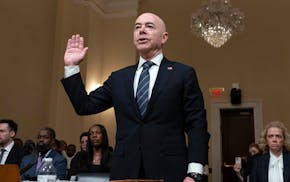WASHINGTON - When Dan Marshall opened his Peapods Natural Toys and Baby Care store in St. Paul a decade ago, his dream was to provide alternatives to cheap, mass-produced toys crowding the market. He sells natural cloth blankets along with trucks, trains, toy blocks and art easels made of wood rather than plastic.
But new government regulations could damage Marshall's dream, and that of others involved in creating and marketing unique and often handmade toys.
Federal legislation passed in response to recalls of millions of toys over the past two years could have the unintended consequence of imposing unaffordable costs on the independent, cottage-industry toymakers Marshall buys from. Already struggling through a punishing recession, those toymakers may be hard-pressed to manage the new costs.
The law, championed by Sen. Amy Klobuchar after the death of a Minnesota toddler who swallowed a Chinese-made charm composed almost entirely of lead, goes into effect Feb. 10. Among other things, it sets strict limits for lead in any toy or children's product sold after that date. It forces manufacturers to prove that each product line, new or existing, is in compliance.
Not for the little guys
The problem, industry advocates say, is that the requirements were designed with large-scale foreign manufacturers in mind, and aren't feasible for small companies.
Marshall, who also founded a coalition of alternative toymakers called the Handmade Toy Alliance (HTA), said independent testing of toys and products costs the businesses in his group anywhere from a few hundred dollars to $4,000 per product.
"If you happen to make 40 different products, which isn't unusual for a small business to diversify their offerings, you multiply that cost ... and it can be a substantial cost just to prove you're in compliance," he said. "These are people crocheting baby hats or making teddy bears out of recycled sweaters out of their living rooms. They're only making their product in small batches."
Jamie Seeley Kriesman co-owns Beka, a small St. Paul company that makes wooden puppet theaters, blocks and easels. Seeley Kriesman sent one of his best-selling products, a 68-piece set of hard maple blocks, for lead testing by an independent lab.
He paid the lab between $200 and $300 to confirm they were in fact just that: unfinished maple blocks.
He estimated that the company will spend about $30,000 on testing this year, "and for us that literally can make the difference between being profitable or not, " he said.
The Handmade Toy Alliance says it would like to see micro-businesses exempted from testing, in much the same way that the Food and Drug Administration exempts local growers from certain labeling requirements when they peddle their produce at farmers markets.
But consumer advocates say that the new law offers needed protection and that it would be a mistake for Congress to revisit the new rules.
"The intent of the bill is not to place huge burdens on these folks, but the problem is the solutions they're advocating for are much, much too broad, and would potentially harm the public health," said Rachel Weintraub of the Consumer Federation of America. The size of the companies involved doesn't change the fact that children should be protected from unsafe toys, she says.
Says Klobuchar: "How do you find out if [the toys] are made of lead or not? You have to test them to figure it out."
Rules slow in coming
Many companies say the new law doesn't spell out exactly which products and parts of products must comply with the new limits -- and that uncertainty is wreaking havoc with business plans. Makers of bicycles, clothing, jewelry and electronics could all be forced to discard millions of dollars in inventory, companies say.
Bicycle suppliers are upset because components such as the valve on a tire often contain lead. Although children aren't likely to ingest that lead, it may be at high enough levels to violate the new ceiling of 600 parts per million.
Unless the manufacturers get an exemption, the law would make it illegal for many of them to sell kids' bikes.
But the solution, Weintraub said, isn't to grant exemptions based on the size of the company. The legislation itself, she says, allows for the Consumer Product Safety Commission (CPSC), the agency charged with interpreting and enforcing the law, to make exemptions for materials that do not pose a health hazard or components embedded inside them that cannot be accessed by a child.
But that requires rulemaking, which can take years.
"Part of the problem is the deadlines for complying with this are coming a lot faster than CPSC has been able to write rulemaking," Marshall said.
"We're still talking about which materials need to be tested, and the deadline is February 10."
Klobuchar said she would work with the companies through the agency and, if necessary, through Congress. But, she noted, "We had a child die from swallowing a charm that was made 99 percent of lead. The laws could not stay as they were."
Mitch Anderson • 202-408-2723
Biden scores endorsements from Kennedy family, looking to shore up support against Trump and RFK Jr
New Black congressional district in Louisiana bows to politics, not race, backers say
Trump trial jury selection process follows a familiar pattern with an unpredictable outcome
Climate change concerns grow, but few think Biden's climate law will help, AP-NORC poll finds
